May 9, 2025 | Civil Rights Law, Constitutional Rights, First Amendment
Protecting free speech and defending against First Amendment retaliation

The purpose of Colorado’s anti-SLAPP law
In a democratic society, the ability to voice opinions about government actions and the conduct of public officials is fundamental. However, sometimes those in power try to silence criticism through costly and intimidating lawsuits. Colorado’s anti-SLAPP law can shield those speaking out on matters of public concern.
Colorado joined the ranks of states with strong anti-SLAPP protections in 2019 when Governor Jared Polis signed House Bill 19-1324 into law. “SLAPP” stands for Strategic Lawsuit Against Public Participation. These lawsuits are often legal bullying tactics used to silence critics by threatening them with expensive litigation.
The Colorado General Assembly recognized this problem and enacted the anti-SLAPP statute, noting “that it is in the public interest to encourage continued participation in matters of public significance and that this participation should not be chilled through abuse of the judicial process.” They stated that the purpose of the law was “to encourage and safeguard the constitutional rights of persons to petition, speak freely, and otherwise participate in government to the maximum extent permitted by law and, at the same time, to protect the rights of persons to file meritorious lawsuits for demonstrable injury.” (C.R.S. § 13-20-1101)
This balancing act helps maintain both free expression and access to justice. The statute protects individuals’ rights to participate in government and speak on matters of public concern while ensuring that truly injured parties can still seek redress through the courts.
SLAPP suits have been used against journalists, environmental activists, consumer advocates, and everyday citizens, like Colorado parents who speak out on matters of public concern involving their schoolchildren. By providing anti-SLAPP protections, Colorado allows journalists to report without fear of financial consequences to their newsrooms and empowers citizens to participate in democratic discourse without fear or intimidation.
How do anti-SLAPP laws work?
Using the special motion to dismiss: A powerful tool for defendants
Colorado’s anti-SLAPP law provides a powerful tool for people who believe they face meritless lawsuits targeting their protected speech. It establishes an expedited process for courts to follow when a defendant files a motion to dismiss a lawsuit based on the fact that they were exercising their constitutional right of free speech or to petition the government.
Here is how this special motion to dismiss works:
-
Filing the motion: A defendant can file a special motion to dismiss within 63 days after being served with the lawsuit. Extensions may be granted with court permission.
-
Showing protected speech: The defendant must demonstrate that the lawsuit is based on their speech or conduct involving a matter of public concern. The law specifically protects statements made before legislative, executive, or judicial proceedings; statements made in connection with issues under consideration by governmental bodies; statements made in public forums about matters of public interest; and other forms of protected speech.
-
Automatic stay of discovery: When a defendant files this special motion, the court issues an automatic stay of discovery, pausing the expensive discovery process until the motion is resolved. This is a crucial protection that prevents plaintiffs from using the discovery process to harass defendants or rapidly drive up litigation costs.
-
Shifting the burden: Once the defendant demonstrates that the case involves protected speech, the burden shifts to the plaintiff to establish “a reasonable likelihood” of prevailing on the claim. This higher standard at an early stage of litigation provides significant protection for defendants.
-
Expedited hearing: The court should hold a hearing on the special motion to dismiss no later than 28 days after it is filed unless the court must schedule it for a later date. This ensures a speedy resolution rather than allowing a SLAPP suit to drag on indefinitely.
-
Attorney fees and costs: If the defendant prevails on the special motion to dismiss, they are entitled to recover attorney fees and costs from the plaintiff. This financial consequence serves as a deterrent against filing frivolous lawsuits intended only to silence protected speech. But if the court finds that a defendant’s special motion was frivolous or solely intended to cause unnecessary delay, it will award attorney fees and costs to the plaintiff instead.
-
Immediate appeal: The order granting or denying the special motion is immediately appealable to the Colorado Court of Appeals. This provides an additional layer of protection for both parties’ rights. (C.R.S. § 13-20-1101.)
The Colorado anti-SLAPP statute has been applied in various contexts, including a recent case before the Colorado Supreme Court examining the “public interest” parameters of the law regarding online reviews of a veterinary clinic. (Tender Care Veterinary Ctr. v. Lind-Barnett)
First Amendment retaliation claims after successful anti-SLAPP motions
An interesting legal scenario arises when a government employee sues a citizen for statements made about that employee’s official actions, and the citizen successfully defends using an anti-SLAPP motion. In such cases, the citizen might have grounds for a First Amendment retaliation claim against the government employee.
While there isn’t a Colorado precedent directly on point, the U.S. Court of Appeals for the Tenth Circuit (which includes Colorado) has provided guidance in cases involving government retaliation for protected speech. In Beedle v. Wilson, the court considered a case where a governmental entity (a public hospital) filed a defamation lawsuit against a private citizen who had criticized it.
The Tenth Circuit recognized that when a governmental entity brings a lawsuit against a citizen for criticizing government actions, First Amendment concerns are implicated. The court determined that such a lawsuit could potentially constitute retaliation that violates the First Amendment and provides grounds for a civil rights claim under law. (42 U.S.C. § 1983)
How First Amendment retaliation claims work using Colorado’s anti-SLAPP law:
-
Protected speech: The defendant’s statements about the government employee’s political or governmental actions would need to constitute protected speech under the First Amendment, which generally protects speech on matters of public concern. The Supreme Court has long held that speech on matters of public concern deserves heightened First Amendment protection, such as in N.Y. Times Co. v. Sullivan, where the court noted the “profound national commitment to the principle that debate on public issues should be uninhibited, robust, and wide-open.”
-
Adverse action: The government employee’s act of filing a lawsuit against the defendant can be considered an adverse action likely to deter a person from continuing to engage in protected speech. In Beedle, the Tenth Circuit recognized that being subjected to litigation could constitute such an adverse action.
-
Causal connection: The crucial element is demonstrating a causal connection between the defendant’s protected speech and the government employee’s retaliatory action (filing the lawsuit). A successful anti-SLAPP motion can provide evidence of this causal link, as it establishes that the lawsuit targeted protected speech.
-
Improper motive: To succeed on a First Amendment retaliation claim, the defendant must show that the government employee’s primary motive in filing the lawsuit was to retaliate against the defendant for their protected speech, rather than to genuinely seek legal redress for a legitimate harm.
In Colorado, this means that if a government employee sues a citizen for statements about the employee’s political or governmental actions, and the citizen successfully defends using Colorado’s anti-SLAPP law, the citizen may have grounds for a federal civil rights lawsuit.
Such a claim would allege that the government employee’s lawsuit constituted illegal retaliation for the exercise of First Amendment rights. If successful, the citizen could recover damages, attorney fees, and costs beyond what the anti-SLAPP statute itself provides. The Civil Rights Attorney’s Fees Awards Act authorizes courts to award reasonable attorney fees to prevailing parties in civil rights litigation.
It’s worth noting that these retaliation claims face certain legal hurdles. The citizen must prove that the government employee acted under “color of law” rather than in a purely private capacity. As the Supreme Court has held, the under-color-of-state-law element of the code excludes from its reach “merely private conduct, no matter how discriminatory or wrongful.” (Blum v. Yaretsky)
Additionally, various immunity doctrines may protect government officials in certain circumstances. Government officials performing discretionary functions are entitled to qualified immunity unless their conduct violates “clearly established statutory or constitutional rights of which a reasonable person would have known.” (Harlow v. Fitzgerald)
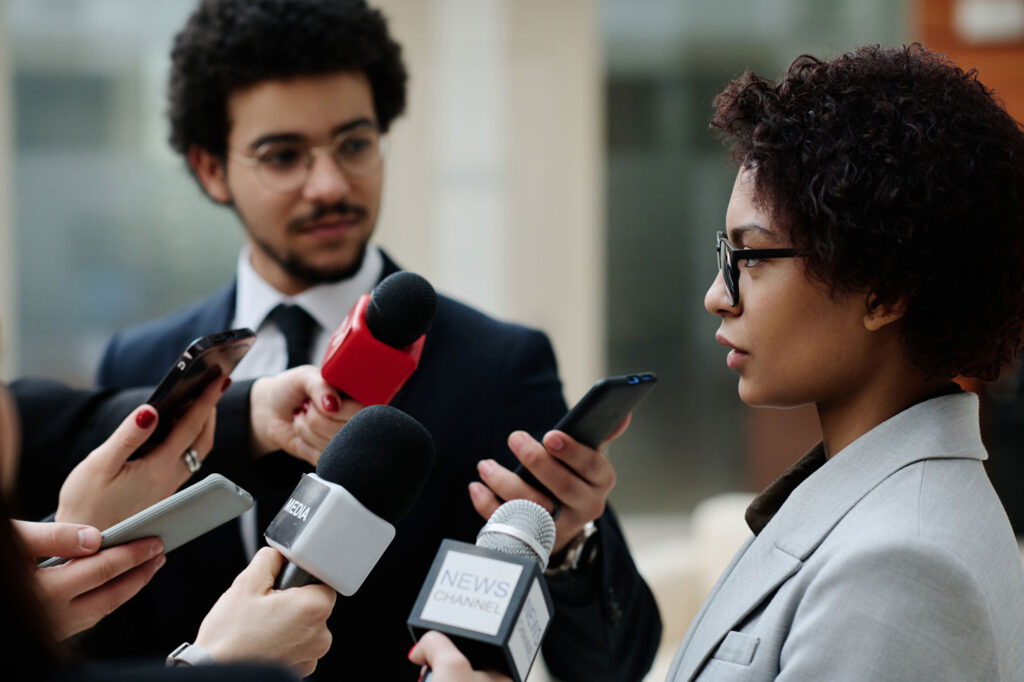 Has your free speech been threatened?
Has your free speech been threatened?
When government employees misuse the legal system to silence criticism of their official actions, the combination of anti-SLAPP protections and potential First Amendment retaliation claims gives citizens powerful legal recourse. They ensure that individuals can speak truth to power without fear of retaliatory litigation designed to silence their voices.
However, while these anti-SLAPP laws shield citizens from legal intimidation tactics, you need an experienced civil rights attorney to help you fight these lawsuits. The Civil Rights Litigation Group understands the expedited process to dismiss meritless lawsuits targeting free speech and the First Amendment retaliation claims that may follow. We believe the law should protect rather than punish those who exercise their constitutional right to comment on matters of public concern. If your free speech rights have been violated, contact us today to see how Colorado’s anti-SLAPP law can protect you.
Call the Civil Rights Litigation Group at 720-515-6165.
Mar 17, 2024 | Civil Rights Law, Constitutional Rights
The First Amendment of the Constitution states that “Congress shall make no law respecting an establishment of religion, or prohibiting the free exercise thereof; or abridging the freedom of speech, or of the press; or the right of the people to peacefully to assemble, and to petition the Government for a redress of grievances.” However, free speech isn’t an all-inclusive principle, meaning that there are some instances of speech and expression that the First Amendment doesn’t protect. What is protected speech?
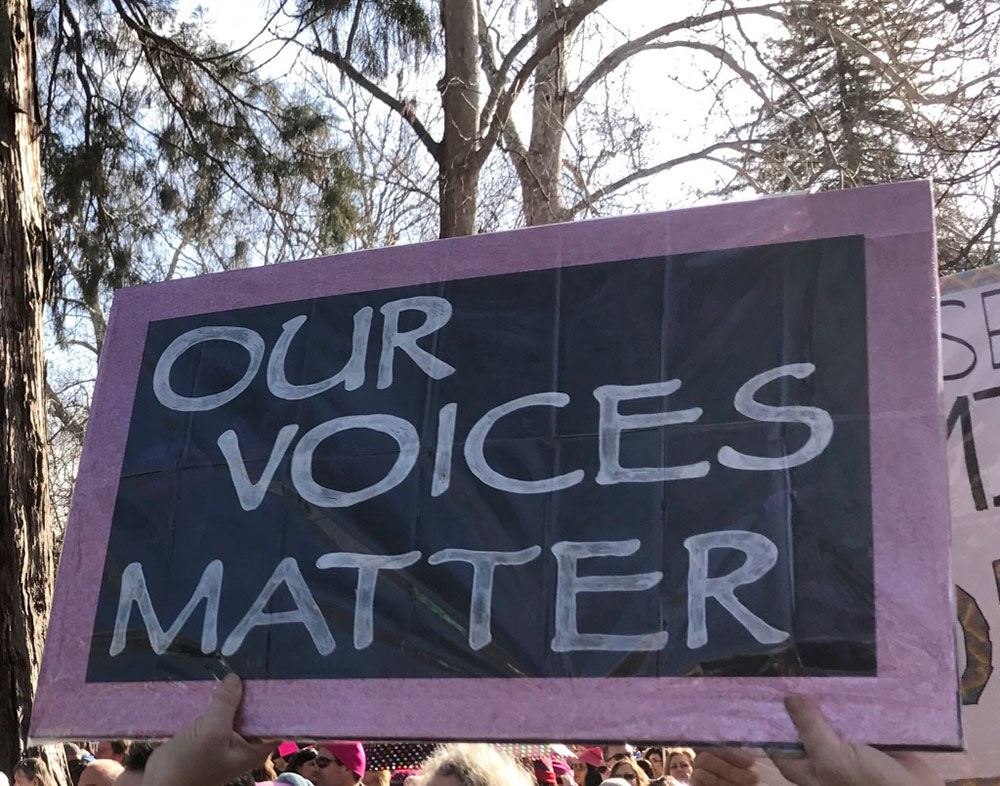
Free speech and protected speech
One reason for continually examining free speech is that the Constitution is vague. The Supreme Court further defined free speech: “If there is a bedrock principle underlying the First Amendment, it is that the government may not prohibit the expression of an idea simply because society finds the idea itself offensive or disagreeable” (Texas v. Johnson). This language restricts the government’s ability to constrain speech, but, the limitations of speech and expression often depend on context, such as a corporate office or a school.
Free speech laws are extremely complex, and it’s critical to remember that free speech doesn’t protect things like defamation and libel, threats, false advertising, and more.
Differences between protected speech and unprotected speech
There are many exceptions to free speech that the Supreme Court has supported for some time. For example, the Court has decided that the First Amendment provides no protections for things like obscenity, child pornography, or speech that constitutes true threats or “fighting words,” which may produce a clear and present danger. The Court provides less than full protections for many other types of speech, including:
- Commercial speech
- Defamation, libel, and slander
- Speech that might be harmful to children
- Speech broadcasts on television and radio
- Public employees’ speech
At the same time, the Supreme Court, as well as many government and nonprofit agencies, have contributed to the definition of protected speech as well. As a broad rule, virtually all other types of speech are protected, but the government may be able to regulate speech in certain circumstances. The government may attempt to regulate an act of free speech (including verbal communication as well as visual, art, music, theater, dance, literature, and more) through prior restraint. Additionally, acts that normally have the fullest First Amendment protections may still be restricted due to “regulations of the time, place, and manner of expression which are content-neutral, are narrowly tailored to serve a significant government interest, and leave open ample alternative channels of communication.”
What to do if your free speech rights were violated
To better understand what constitutes protected speech and unprotected speech (and therefore, your rights in Colorado regarding free speech), here are a few examples:
-
Subversive advocacy — Individuals can express lawlessness, but there is a limit to this protection. For subversive advocacy (expression promoting lawlessness) to fall outside of First Amendment protections, it needs to be directed at producing imminent lawless action and the speech needs to be likely to produce lawless action.
-
Fighting words — Similar to the above example, speech cannot incite clear and present danger or violence. However, fighting words often need to be insults personally directed at a person and not political statements that the person would find offensive. Provocative political speech is often fully protected, but not clear and directed insults designed to start a fight or a threat.
-
True threats — True threats are defined as “statements where the speaker means to communicate a serious expression of an intent to commit an act of unlawful violence to a particular individual or group of individuals.” As such, the speaker may not need to carry out the threat, but only to intently produce fear of bodily harm or death in the victim.
-
Obscenity — Material, speech, and/or expression must meet the following three standards to be considered obscene and not protected by First Amendment laws. These three standards include:
- Whether “the average person, applying contemporary community standards”, would find that the work, taken as a whole, appeals to the prurient interest
- Whether the work depicts or describes, in a patently offensive way, sexual conduct or excretory functions specifically defined by applicable state law
- Whether the work, taken as a whole, lacks serious literary, artistic, political, or scientific value.
-
Child pornography. Plainly put, child pornography is an unprotected category of expression.
-
Commercial expression that concerns illegal activity, or commercial expression that is false or misleading — Commercial speech is only protected if it contains legal activity and it’s content is true and not misleading.
Contact the Civil Rights Litigation Group in Denver
The Civil Rights Litigation Group deals with issues regarding free speech. First Amendment and protected speech legal cases can be extremely complex, but at the same time, it is clear when someone is making true threats, producing obscene material, or producing false advertising and misleading information. Fortunately, if your right to free speech is being regulated or restricted in any way — or you’re facing adverse repercussions for your speech, and your speech doesn’t fall under the umbrella of “unprotected speech”— then call the Civil Rights Litigation Group in Denver, CO. We offer free, no-obligation consultations.
Call our law offices today at 720-515-6165.
May 27, 2020 | Civil Rights Law, Constitutional Rights, Police Misconduct
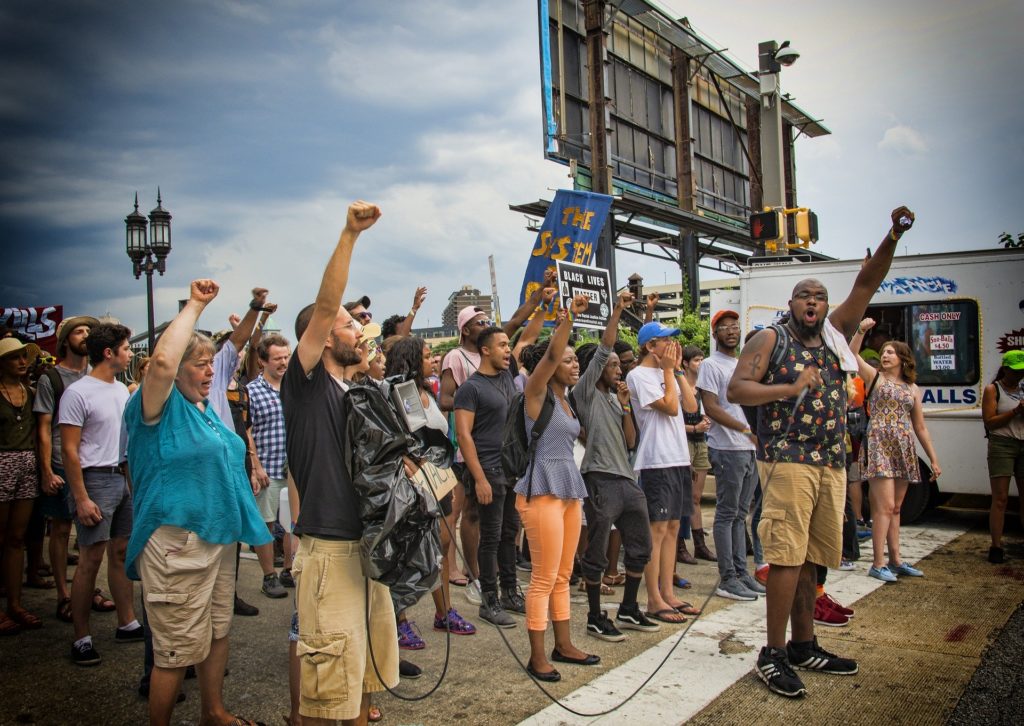 The most important thing to remember is that the First Amendment guarantees every person in America the right to peacefully assemble and protest.
The most important thing to remember is that the First Amendment guarantees every person in America the right to peacefully assemble and protest.
Congress shall make no law respecting an establishment of religion, or prohibiting the free exercise thereof; or abridging the freedom of speech, or of the press; or the right of the people peaceably to assemble, and to petition the government for a redress of grievances.
The right to protest is valued in our country and has led to many substantial changes over the past 200 years, such as the Civil Rights Act. When outrageous police abuse occurs — such as the killing of George Floyd in Minneapolis or the beating of Rodney King in Los Angeles — that conduct affects us all. Exercising your right to speak up and to protest could foster recognition, awareness, and much needed change in the future.
However, it’s important to remember that the Supreme Court has recognized limits to the exercise of our rights – when they could affect the rights of others. Just like freedom of speech doesn’t provide the right to publicly lie about someone or the right to yell fire in a crowded theater, the right to assemble does not mean that a protester has cart-blanche protection to commit otherwise illegal acts, such as vandalism, and there could be criminal repercussions for those who harm others.
Also, current law permits “reasonable time, place, and manner” restrictions by governments to limit some of the unintended adverse effects of those who gather to speak in local communities. Legal interpretations of what constitutes “reasonable” time, place and manner restrictions can be nuanced, but they usually permit municipal action to do things like restrict protesters from marching down the middle of busy streets or instituting non-discriminatory curfews to curb looting and vandalism. Protesters have more leeway regarding location and time when a protest is spontaneous, such as immediately after a major incident occurs that calls for public outcry, like the events in recent days. However, the protection for spontaneous association will likely be subject to greater “time, place, and manner” restrictions after initial protests erupt and/or after public safety concerns surface.
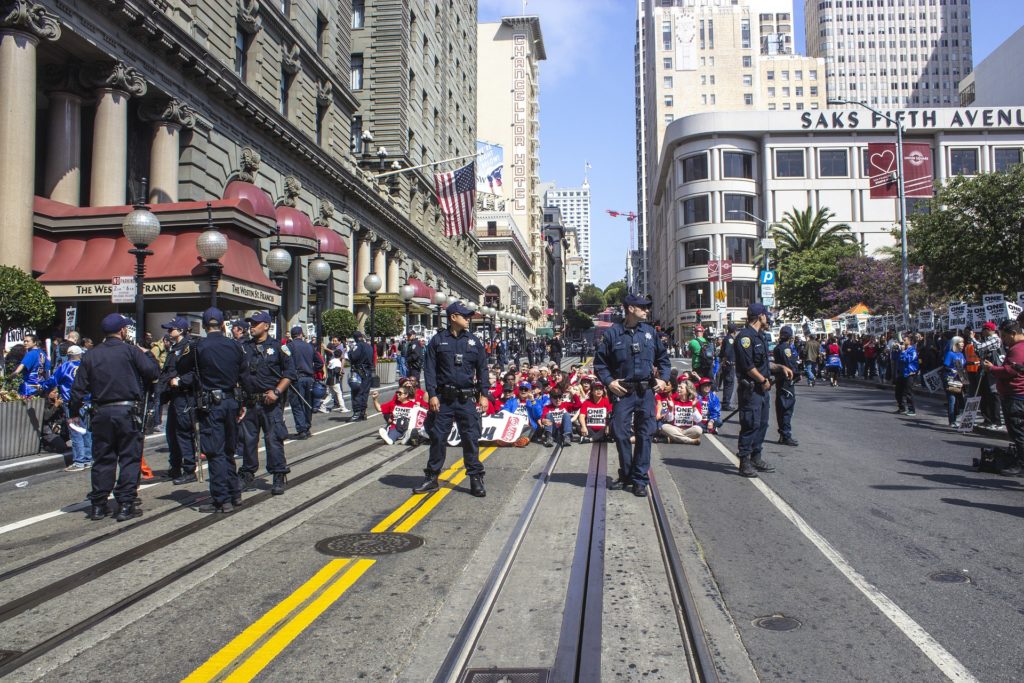
When can the police interfere with protests?
If a protest escalates to include violence and property damage, local law enforcement has the legal authority to intervene to quell that violence or to arrest perpetrators. They may also have the legal authority to stop protests on private property, those organized without a permit, or those that block public rights of way, such as on an interstate or major street.
As to the time or duration of protests, law enforcement can intervene if a curfew has been legally established and police have given you warning, time, and opportunity to safely leave. Police should act only to apply limited restrictions in a non-discriminatory and even-handed manner.
What am I allowed to record at a protest?
There have been a lot of contrary opinions written regarding what citizens can and can’t record, with respect to the police. And while some states have limits on where you can post recordings with audio, the visual part of recordings is protected by the First Amendment and can be posted online and shared.
You have a First Amendment right to record the police while they are performing public duties. As long as you aren’t interfering with or threatening them, and stay a fair distance away from officers performing official functions, the police DO NOT have the legal authority to demand that you stop recording. In fact, it’s always a good idea to record any encounter with the police if you think things might go bad for anyone involved. Phone recordings have been key in prosecuting police misconduct in recent years, especially with the quality of video that most cell phones can produce. As Will Smith said, “Racism isn’t getting worse, it’s getting filmed.”
Also, the police cannot legally demand your phone or confiscate it without a warrant, and those take time to obtain because they have to be signed by a judge. They also don’t have the authority to tell you to delete a photo or video. If you feel a confrontation may occur — especially one involving force — many have suggested complying, handing over the device, and then filing a complaint with Internal Affairs, the Office of the Independent Monitor (in Denver), or legal organizations like the ACLU or with local lawyers. But you absolutely have the right to retain possession of your phone along with any video or photos. If nothing else, quickly send or upload the media to someone before handing over your phone so that it cannot be deleted. The ACLU has developed a smart phone application that – once activated – will record and automatically upload any video taken from that phone to the ACLU for safe-keeping and later review:
https://www.aclu.org/issues/criminal-law-reform/reforming-police/aclu-apps-record-police-conduct
If you don’t like your own photo being taken or publicly shared, you should know that your presence at a public protest means you have given consent for your photo to be taken and potentially used, most commonly by the media. After-all, protests are meant to be matters of public interest. There are a few restrictions, but if you are uncomfortable with your photo showing up on social media or potentially the evening news, you should consider other forms of speech or wearing something that hides your identity.
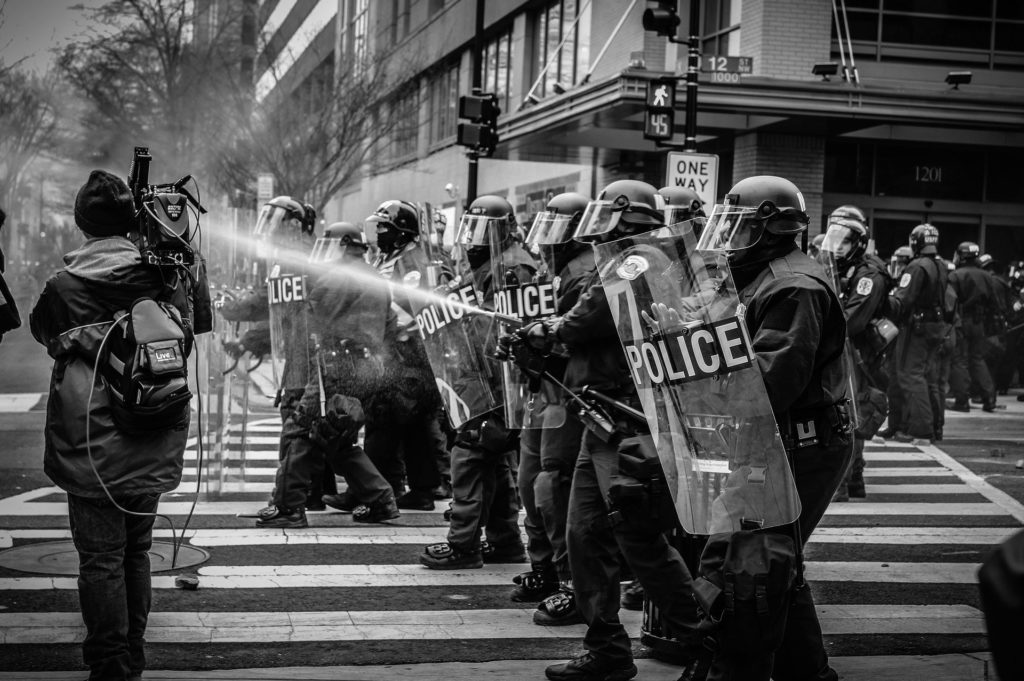
What are the police allowed to do during a protest?
The first job of the police is to protect your right to peacefully assemble — both they and public officials have taken a vow to uphold the Constitution. If you are acting reasonably, within the confines of the law, then they have no authority to act against you or restrain you in any way. However, they are also charged with maintaining order and upholding the law, so if protesters or infiltrators start being violent or causing damage then the police will most likely take action. The concern for all of us is what form that action takes and whether it is proportionate to the public policy and/or legal justifications permitted under the law.
The main priority of police should be to de-escalate violence, but it has been shown time and again that the police often are the cause of violence. For example, if they start dropping tear gas canisters and firing rubber bullets at peaceful protesters before curfew has started, and without any legal and/or legitimate purpose, then they could be found liable for use of excessive force. This is one of the times when it is important to always be recording police on your phone.
What should I do if the police stop me or if I get arrested?
First of all, it’s always good to stay calm. Remember that sometimes the police just want to ask a question and you may not be suspected of doing anything wrong. The law permits police to ask questions without converting the contact into a seizure. Second, get your phone out and start recording. Finally, you always have the right to ask the police if you are being detained and/or free to go. If they indicate you are not being detained or are free to go, just calmly leave — you are under no obligation to speak to them. If they detain you, you have the right to ask why you are being detained.
If you are arrested or detained — whether justified or not — it’s best to remain calm and not resist. If other people are there, ask them to record everything they can. You do not have to speak to the police if you don’t want to — you have the right to remain silent. After you are booked, you will have the right to make a phone call so it’s a good idea to write a few numbers on your arm since your phone will be taken away. And it’s always a good idea to call a lawyer because while that conversation is privileged, the police do have the authority to listen in on calls to friends or family.
What should I do if I feel my rights were violated at a protest?
If you truly feel your rights were violated, the first step is always to gather evidence to support you. You have the right to sue for the violation of your rights and you should contact a civil rights attorney devoted to your rights. 42 U.S.C. Section 1983 of federal law permits those who are violated by official government actors (such as police) to seek redress in federal court. However, police officers are also covered by qualified immunity, which means they are shielded from civil liability if they didn’t break a clearly established law. That is one reason it is so important to record any interaction with the police as many of them are still not required to wear body cameras. Recordings remove much of the grey area of “he said, she said” when courts are charged with determining who is telling the truth. Video doesn’t lie.
We are here to help with protecting your Constitutional right to protest
If you have experienced problems with your civil rights being violated during a protest, please give us a call. We work diligently to protect constitutional rights. For a free, no-obligation consultation with the Civil Rights Litigation Group, contact our Denver CO law firm today at (720) 515-6165 or use our online contact form.

 Has your free speech been threatened?
Has your free speech been threatened?


 The most important thing to remember is that the First Amendment guarantees every person in America the right to peacefully assemble and protest.
The most important thing to remember is that the First Amendment guarantees every person in America the right to peacefully assemble and protest.
